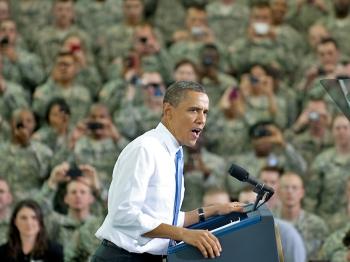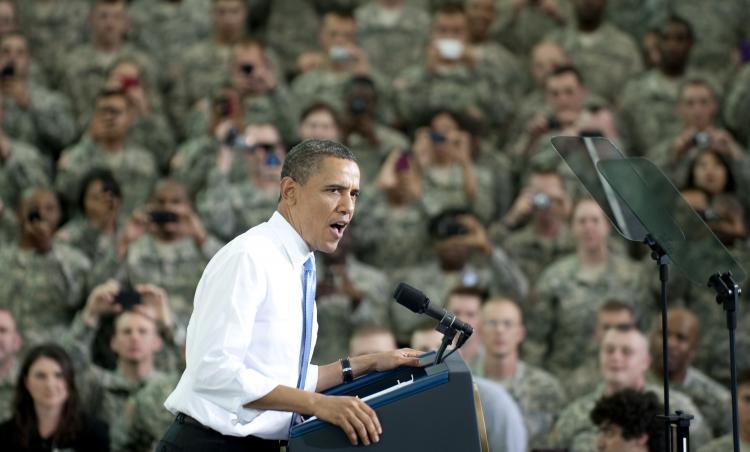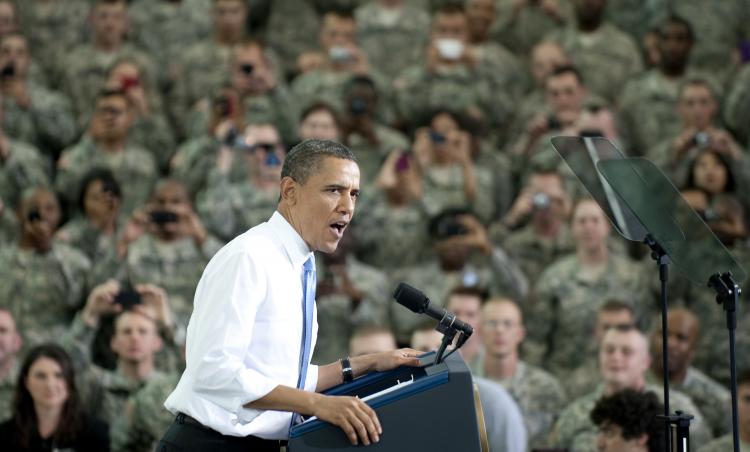The US has pulled off a massive coup by successfully taking out Osama bin Laden, the al-Qaeda leader and mastermind behind the tragic 9/11 attacks in New York. The move marks a maturity in dealing with attacks on U.S. sovereignty and indeed the civilised world.
Congratulations have poured in from around the globe for U.S. President Barack Obama and the US forces for the death of the most wanted terrorist in the world.
British Prime Minister David Cameron sent his congratulations, saying: “9/11 was an attack not just on the United States, but on all those who shared the best values of civilisation.”
Australian Prime Minister Julia Gillard thanked the president and the U.S. forces, saying: “I welcome the news of the death of Osama bin Laden.”
Congratulations also came from Afghani leader Hamid Karzai and even Yousuf Raza Gilani, the Pakistani prime minister, whose military forces have come into criticism for failing to either know of or to act upon information that the wanted terrorist was living only kilometres from Pakistani military operations.
“We will not allow our soil to be used against any other country for terrorism and therefore I think it’s a great victory,” Mr Gilani said.
There is no doubt it is an important win for President Obama, who had made it an election promise to bring bin Laden to justice and who was integrally involved in the planning of the raid.
The fact that he was able to deliver on his promise will not only aid in regaining lost stature as he approaches the 2012 presidential elections, but may also subdue those critical of his approach to national security.
It also marks some significant developments within the Obama administration.
It will for one define the withdrawal of U.S. troops from Afghanistan, an initiative Mr Obama had put in place that is due to commence in July this year.
One of the original mandates for the U.S. presence in Afghanistan was to capture or kill Osama bin Laden. That has been achieved now and will contribute to the view that the withdrawal is not a back down, but rather a job done.
The decisive action in overwhelming bin Laden and the way it was implemented is also an indication that the US is coming to grips with the challenges it faces in the world of international terrorism.
We now know that the plan was put into play after months of discussions and that it was inclusive—involving Vice President Joe Biden, Defence Secretary Robert Gates, Secretary of State Hillary Clinton, the CIA and an elite group of specialists—It was also well thought out, decisively and effectively implemented with minimum collateral damage, and no loss of American lives. In fact it was suggested that a bomb be used to take bin Laden out and reportedly, President Obama had rejected that with concerns to minimise loss of life.
The plan was a response to terrorism, not a reaction, an approach many believe was responsible for the ill-conceived invasion of Iraq.
It is an indication that the U.S. has learned from the past, but how the Obama Administration moves forward in its wisdom will now be the test.
One the one hand, taking out Osama bin Laden, with all the overt U.S. celebrations widely screened around the globe, will goad fundamentalist Islamic groups into reprisals. Terrorism has not been annihilated with bin Laden’s death and Western leaders, while congratulating the U.S. on its success, have been quick to warn their citizens of a possible terrorist backlash.
However, bin Laden was no longer a plotter of attacks, but a figurehead for al-Qaeda, who used a massive publicity machine to encourage and ultimately spawn thousands of fanatical fringe terrorist groups.
While the threat from those remains, his potency and al-Qaeda’s as a movement has passed. Disaffected Arabs and Muslims, the audience that al-Qaeda so intensely appealed to, have largely moved on.
Demonstrators presently on the streets of Yemen, Bahrain, Libya and Syria do not want terrorism, they do not want their 12-year-old children to be recruited as suicide bombers or to be blown up with their families like many, many other Muslims that have fallen victim to al-Qaeda attacks. They are calling for democracy and basic freedoms.
How the U.S. handles that call in the Middle East and North Africa will be its next big challenge.
Congratulations have poured in from around the globe for U.S. President Barack Obama and the US forces for the death of the most wanted terrorist in the world.
British Prime Minister David Cameron sent his congratulations, saying: “9/11 was an attack not just on the United States, but on all those who shared the best values of civilisation.”
Australian Prime Minister Julia Gillard thanked the president and the U.S. forces, saying: “I welcome the news of the death of Osama bin Laden.”
Congratulations also came from Afghani leader Hamid Karzai and even Yousuf Raza Gilani, the Pakistani prime minister, whose military forces have come into criticism for failing to either know of or to act upon information that the wanted terrorist was living only kilometres from Pakistani military operations.
“We will not allow our soil to be used against any other country for terrorism and therefore I think it’s a great victory,” Mr Gilani said.
There is no doubt it is an important win for President Obama, who had made it an election promise to bring bin Laden to justice and who was integrally involved in the planning of the raid.
The fact that he was able to deliver on his promise will not only aid in regaining lost stature as he approaches the 2012 presidential elections, but may also subdue those critical of his approach to national security.
It also marks some significant developments within the Obama administration.
It will for one define the withdrawal of U.S. troops from Afghanistan, an initiative Mr Obama had put in place that is due to commence in July this year.
One of the original mandates for the U.S. presence in Afghanistan was to capture or kill Osama bin Laden. That has been achieved now and will contribute to the view that the withdrawal is not a back down, but rather a job done.
The decisive action in overwhelming bin Laden and the way it was implemented is also an indication that the US is coming to grips with the challenges it faces in the world of international terrorism.
We now know that the plan was put into play after months of discussions and that it was inclusive—involving Vice President Joe Biden, Defence Secretary Robert Gates, Secretary of State Hillary Clinton, the CIA and an elite group of specialists—It was also well thought out, decisively and effectively implemented with minimum collateral damage, and no loss of American lives. In fact it was suggested that a bomb be used to take bin Laden out and reportedly, President Obama had rejected that with concerns to minimise loss of life.
The plan was a response to terrorism, not a reaction, an approach many believe was responsible for the ill-conceived invasion of Iraq.
It is an indication that the U.S. has learned from the past, but how the Obama Administration moves forward in its wisdom will now be the test.
One the one hand, taking out Osama bin Laden, with all the overt U.S. celebrations widely screened around the globe, will goad fundamentalist Islamic groups into reprisals. Terrorism has not been annihilated with bin Laden’s death and Western leaders, while congratulating the U.S. on its success, have been quick to warn their citizens of a possible terrorist backlash.
However, bin Laden was no longer a plotter of attacks, but a figurehead for al-Qaeda, who used a massive publicity machine to encourage and ultimately spawn thousands of fanatical fringe terrorist groups.
While the threat from those remains, his potency and al-Qaeda’s as a movement has passed. Disaffected Arabs and Muslims, the audience that al-Qaeda so intensely appealed to, have largely moved on.
Demonstrators presently on the streets of Yemen, Bahrain, Libya and Syria do not want terrorism, they do not want their 12-year-old children to be recruited as suicide bombers or to be blown up with their families like many, many other Muslims that have fallen victim to al-Qaeda attacks. They are calling for democracy and basic freedoms.
How the U.S. handles that call in the Middle East and North Africa will be its next big challenge.






